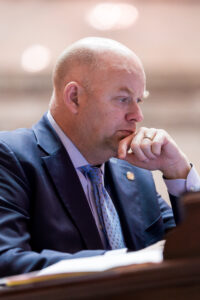Senate Republican Deputy Leader Drew MacEwen called on his colleagues to adopt the budget proposal unveiled by Senate Republicans today, saying it is proof that state lawmakers can adopt a new two-year operating budget that is better for education, protects our state’s most vulnerable citizens, and invests in public safety, without increasing the tax burden on struggling Washington families or foolishly raiding the state’s rainy-day fund.
“All we have heard from the majority party is that our only choice is between a plan that slashes and burns vital services or one that implements record-high tax hikes at a time when Washington is already dealing with an affordability crisis,” said MacEwen, R-Shelton.
“The Democrat majority ‘no revenue’ budget, which contains draconian cuts across the board, is what I believe is simply a scare tactic, and more than anything else, it demonstrates their failure to properly budget over the last several cycles.
“There is a better way, and the Senate Republican budget proves it.”
The $75.6 billion Republican plan, billed as the “$ave Washington” budget, represents a 5% increase in spending from the two-year budget that will expire June 30. State revenues are expected to grow 7.6 percent.
The $ave Washington approach works by applying basic family-budgeting principles on a much larger scale. Spending is focused on priorities: For the first time in six years, K-12 education would receive a larger share of the budget, with hundreds of millions more going to special education and classroom materials.
The plan would preserve and maintain services for seniors, people with developmental disabilities, and those needing behavioral-health treatment.
It would also fund the policy in SB 5060, supported by Gov. Bob Ferguson, which would make grants available to communities for hiring law-enforcement officers.
To help make the additional investments in priorities, the Republican budget plan would freeze the rates and eligibility threshold for state-subsidized childcare, institute reforms at the Department of Children, Youth and Families to reduce administrative costs in favor of increasing front-line workers – “boots on the ground,” and avoid new Democratic spending that hasn’t gone into effect yet.
The legislative branch of state government would be required to find 6% in savings; executive-branch agencies that don’t serve clients directly would only have to find 3% savings, compared to the 6% sought by Ferguson; and higher-education institutions would only be required to make 1.5% in reductions.
The Republican budget also would avoid about $4 billion in anticipated spending by putting off the back-to-back pay raises for state employees and social-service providers that had been negotiated by the former governor.
Instead, each would get a $5,000 bonus, which honors their contributions in a progressive manner while also recognizing the deals negotiated last summer are not financially feasible.
Under the Republican plan, another $4 billion would be saved by prioritizing and repurposing surplus money from a major state-managed pension fund and a variety of smaller accounts. And the Climate Commitment Act would become the primary support for the working families tax credit, which under the law is first in line for funding.
The remaining savings come from a collection of reforms and efficiencies that make government work better.
“The bottom line is that there are solutions, and we simply have to get back to responsible budgeting,” MacEwen added. “It’s time to ask government to tighten its belt and stop asking more from the taxpayers.”








